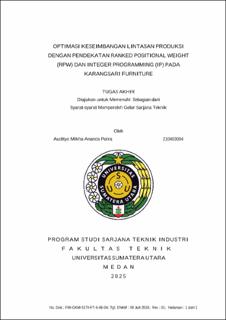Optimasi Keseimbangan Lintasan Produksi dengan Pendekatan Ranked Positional Weight (RPW) dan Integer Programming (IP) pada Karangsari Furniture
Optimization of Production Line Balancing Through Ranked Positional Weight (RPW) and Integer Programming (IP) Methods at Karangsari Furniture

Date
2025Author
Putra, Audityo Mikha Ananda
Advisor(s)
Ginting, Rosnani
Metadata
Show full item recordAbstract
CV Karangsari Furniture is a private company dedicated to the production of
various types of furniture, with its flagship product being two-door wardrobes.
Observations on the production floor have identified a bottleneck at the gluing
workstation, evidenced by the accumulation of semi-finished goods and disparities in cycle times across workstations. This issue arises due to the complexity of the production process, compounded by the disproportionate distribution of workload among workstations. This study aims to enhance the balance of the production line by employing the Ranked Positional Weight (RPW) and Integer Programming (IP) methods. Data collection was conducted through direct and repeated measurements of the time required for each work element. The results of the data adequacy and uniformity tests indicate that the operational time data meet the criteria for sufficiency and uniformity, making them suitable for further analysis. The application of the RPW method resulted in a production line configuration consisting of five workstations: measurement and cutting, gluing, assembly, accessory installation, and finishing. Meanwhile, the implementation of the Integer Programming method, with the objective function “min cycle time”, and constraints related to cycle time, resources, and inter-process relationships, yielded a configuration of four workstations by merging the assembly and accessory installation workstations. A comparison of the two methods demonstrates that
Integer Programming significantly reduces the number of workstations and
enhances production line efficiency while adhering to precedence and zoning
constraints. The implementation of this solution is expected to address the
accumulation of semi-finished goods and reduce idle time in the production of twodoor wardrobes at CV Karangsari Furniture.
Collections
- Undergraduate Theses [1600]
